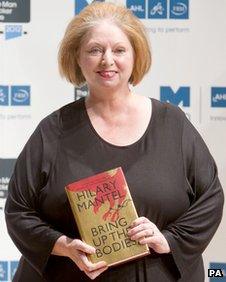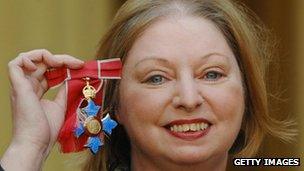Hilary Mantel: Double Man Booker winner profiled
- Published

Mantel has now begun work on the third book in her Wolf Hall trilogy
Hilary Mantel has become the first woman and the first living British author to win the Man Booker prize twice.
The victory also makes the 60-year-old - only the third double winner of the prestigious literary accolade - the first person to win for a direct sequel.
Born Hilary Thompson in Glossop, Derbyshire in July 1952, Mantel studied Law at the London School of Economics and Sheffield University.
The author of 12 books, she lived in Botswana for five years and Saudi Arabia for four before returning to Britain in the mid-1980s.
Her first published novel, Every Day is Mother's Day, arrived in 1985 and told of an agoraphobic clairvoyant, her daughter and their social worker.
Inspired in part by the author's experiences as a social work assistant at a geriatric hospital, the novel spawned a sequel, Vacant Possession, in 1986.
In 1987 - the year Mantel began a four-year stint as film critic for The Spectator - she was awarded the Shiva Naipaul Memorial Prize for an article about Jeddah.
The Saudi Arabian city provided the setting for her third novel, Eight Months on Ghazzah Street, and drew on her time being posted there with her husband, Gerald McEwan, a geologist she met at the University of Sheffield in the 1970s.
Fludd, her next novel, was set in a mill village in the north of England in the 1950s and told of a newcomer's impact on the local convent and church.
Published in 1989, this dark, often surreal fable went on to win the Winifred Holtby Memorial Prize, the Cheltenham Prize and the Southern Arts Literature Prize.
Further accolades came in 1992 when A Place of Greater Safety - a historical novel set during the French Revolution - won the Sunday Express Book of the Year award.
After A Change of Climate (1994), about a missionary couple who lose a child, came An Experiment in Love (1995), about three schoolfriends from northern England, and The Giant, O'Brien (1998), about an Irishman who comes to London to make his fortune as a sideshow attraction.
In 2003, Mantel published Giving Up the Ghost: A Memoir, in which she wrote about her early childhood, her Catholic upbringing and how she came to be a writer.
The title referred to the "ghosts of other lives you might have led", as the author realised she was "staring 50 in the face".

The author was made a CBE by The Queen in 2006
She also wrote movingly about a persistent illness, eventually diagnosed as the painful womb condition endometriosis, that left her unable to have children.
"You think of the children you might have had but didn't," she wrote. "When you think you're pregnant, and you're not, what happens to the child that has already formed in your mind? You keep it filed in a drawer of your consciousness, like a short story that never worked after the opening lines."
Although she was made a CBE in 2006, she was only starting to break into public consciousness.
Her novel Beyond Black, about a medium who is tormented by her acquaintances, both the living and the dead, was shortlisted for a Commonwealth Writers Prize and the Orange Prize for Fiction.
But it was 2009's Wolf Hall that really made her name.
Chronicling Thomas Cromwell's rise from blacksmith's son to a prominent position in Henry VIII's court, the novel became a best-seller after winning the 2009 Man Booker Prize and various other awards.
Bring Up the Bodies, winner of this year's prize, continues Cromwell's story, to be concluded in The Mirror and the Light, the culmination of Mantel's Wolf Hall trilogy.
"The books are written from behind Cromwell's eyes," Mantell told the BBC, external, "so you have a privileged, but narrow, insight. I suppose a gap of irony opens for the reader, because we know a great deal more than Cromwell does".
Wolf Hall and Bring Up the Bodies are currently being adapted into a six-part series for BBC Two, expected to be broadcast late next year.
The author - who took her surname from her stepfather - described her second Booker triumph as "an act of faith and a vote of confidence" from the judging panel.
Receiving her award on Tuesday at London's Guildhall, she joked: "You wait 20 years for a Booker Prize and two come along at once."
The award will undoubtedly raise expectations for the trilogy's culmination, and Mantell has admitted The Mirror and the Light, which will chronicle Cromwell's downfall, would be a "complex" and "complicated" book.
"What I want to do is hold up a mirror to everything that's gone before, and also shed new light on it. So what I'm trying to do is make three books that stand up independently, yet the third volume would have to contain them all.
"It still has to surprise the reader, and I guess it will surprise me in the writing.
"But I'm not intimidated. I think I can bring it home in style."
- Published16 October 2012
- Published17 October 2012
- Published24 August 2012